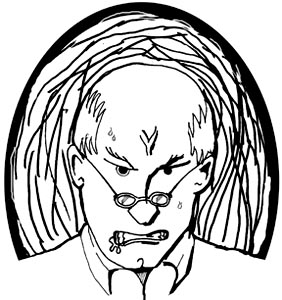![[Metroactive Features]](/features/gifs/feat468.gif)
[ Features Index | San Jose | Metroactive Central | Archives ]
 Illustration by Jeremy Russell Mad About Work Schizoid man's famous diary holds true today By Annalee Newitz EVER SINCE I MADE the thoroughly insane decision to earn a Ph.D. (technically making me a doctor of culture), I've been obsessed with mad doctors. I think you know who I mean when I say "mad doctors": the kinds of demented but highly trained professionals who do things like sew a bunch of body parts together and bring them to life, or drink potions which alter their molecular structures, or hack Microsoft's servers to peek at their proprietary source code. Often the mad doctor has some kind of mind-bogglingly innovative breakthrough which goes awry. Or, as in the case of our mad Microsoft hacker, the benevolent individual in question is treated as "mad" by a society which doesn't understand his or her brilliant, idealistic theories. I've been reading the autobiography of one of the 20th century's most famous mad doctors, Daniel Paul Schreber. A German jurist who went insane, Schreber recorded his experiences as a paranoid schizophrenic, publishing a nearly 500-page volume in 1903 called Memoirs of My Nervous Illness (republished in 2000). Schreber, having discovered that he could talk to the sun, the birds and God, records how he came to believe that every soul is made up of "nerves" and "rays," many of which were penetrating Schreber's body and torturing him. He also developed an elaborate theory about how God wanted to turn him into a woman, impregnate him and allow him to become the mother of a new race of human beings on earth. All of this is discussed in the kind of painstaking detail that you'd expect from a lawyer. Schreber's book became a cult classic among psychoanalysts and philosophers. His plight was dissected by Freud--who of course thought the voices in Schreber's head all had to do with repressed homosexuality. In the 1960s, Schreber was famously exalted by French poststructuralist philosophers in a book called Anti-Oedipus: Capitalism and Schizophrenia. Their idea, in part, was that Schreber's articulate madness was a kind of political revolt against his repressive society and the horrifying, authoritarian world of the mental asylum where he was imprisoned for several years. Reading Schreber's description of going mad is eerie because his life so closely resembles my own and those of many other workaholics in the information industry. It differs only in the magnitude of his insanity. The child of an authoritarian father famous for writing books on raising children to be obedient (sort of an anti-Dr. Spock), Schreber was obsessed with orderliness and work. After being appointed to a high office in the Superior Court of Dresden, Schreber was overwhelmed by his workload and office politics. Eventually, he began to hear crackling noises in his walls every night. He couldn't sleep, and grew more and more nervous. Admitted to an insane asylum, Schreber was subjected to morphine treatments, restraints and isolation. Not surprisingly, his insomnia and nervousness worsened, and the crackling in the walls resolved itself into hundreds of voices speaking in his head simultaneously. He spent all his time communicating with the voices, not sleeping or eating, and gradually became so unhinged that he decided the people and places around him were imaginary. Schreber's compulsive thinking sounds like what we're all supposed to do in the information economy, but taken to its logical extreme. Many of us are supposed to communicate with hundreds of "voices" (many of which arrive via Schreberish "rays" in fiberoptic cables or beamed directly to our cell phones). We're supposed to assimilate thousands of tiny pieces of information in our minds, deprive ourselves of sleep, then think coherent thoughts which our companies can use, patent or simply own as intellectual property. Perhaps most frighteningly, whenever we engage in compulsive thinking on the job, our thoughts are not our own. They seem like voices in our heads because, if left to our own devices, most of us would not spend hours at a time thinking about how to debug a piece of code or organize financial information on a spreadsheet. Every day that we work and engage in compulsive thinking, we are quite literally losing our minds. We may be losing them to corporations rather than madness, but at the end of the day, sometimes it's hard to tell the difference.
Annalee Newitz is a mad doctor and can be reached at schreber@techsploitation.com. [ San Jose | Metroactive Central | Archives ]
|
From the November 2-8, 2000 issue of Metro, Silicon Valley's Weekly Newspaper.
Copyright © 2000 Metro Publishing Inc. Metroactive is affiliated with the Boulevards Network.
For more information about the San Jose/Silicon Valley area, visit sanjose.com.